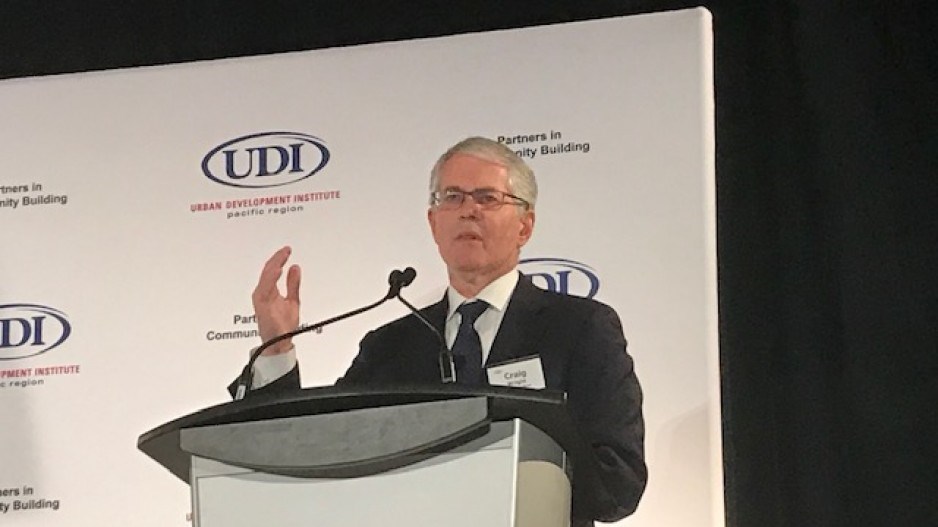Craig Wright, chief economist for RBC, was in Vancouver today, November 21, talking about the R word.
No, not “recession” – “real estate.”
Well, actually, he spoke about both. But given that he was speaking to members of the Urban Development Institute (UDI), there was a heavy emphasis on housing and the role it plays in B.C.'s economy, which appears to be in a good position to weather a global downturn.
While B.C.’s forestry sector is getting hammered, and B.C. exports in general are vulnerable to falling trade, the fundamentals of B.C.’s economy are otherwise strong – so strong, RBC forecasts B.C. will lead growth in Canada next year.
It has a provincial government surplus with fairly comfortable contingencies built in, very high employment and low unemployment, the highest immigration inflows in Canada, and billions of dollars of investment pouring into large projects, notably the $40 billion LNG Canada project.
It’s one Achilles heel, from an economic standpoint, is its lack of affordable housing, which has consumers leveraged to the eyeballs, meaning they have less money to spend in the domestic economy.
And Wright lays the blame for the problem largely on the steps of city hall, not on the steps of Parliament or the B.C. Legislature.
B.C.’s housing problems is all about supply, he said, whereas the only levers that senior governments have been pulling are on the demand side.
“A lot of the control of supply rests at the municipal level,” Wright said.
Levers like foreign buyers and speculation taxes have had their intended effect of cooling the housing market, but only go so far to address issues of housing affordability.
“They tighten on the demand side, things cool off, the market recalibrates, and then it takes off again because supply hasn’t been changed dramatically, and that’s going to continue until we see more supply coming into the market," Wright said.
“It’s not a demand issue– it’s a supply issue. We don’t build enough.
“So really, it’s the federal government working with the wrong tools. It’s having your plumber fix an electrical problem. This isn’t going to end happily.”
UDI president Anne McMullin said her members tell her they don’t want to invest in B.C. because it’s just too difficult to get through the various levels of municipal red tape.
“If our members are going elsewhere and not investing here, what does that say when you look at the potential of a recession?” she asked.
If a recession does come, trade will likely be the trigger, Wright said.
Global trade is in decline for the first time since the 2008-2009 global financial crisis, Wright said. Much of Canada’s trade is with the U.S. B.C. is a bit less exposed than other provinces, since its trade is more diversified.
“I think if a recession comes about, it’s from the external market, not a domestic recession,” Wright said. “That said, when the downturn does hit, with the consumer leveraged up as highly as it is, the weakness will be a little more pronounced.
“As long as the unemployment rate continues to hold and doesn’t spike significantly higher, Canadians will continue to muddle through. They’ll pay this off, they’ll manage to service this debt. They just won’t have the added lift in consumer spending.”
The one sector that is taking a serious beating in B.C. is forestry. B.C. forestry exports are down 28%, Wright said, and exports more generally from B.C. are down 12%.
“B.C. has the weakest in export performance of all the provinces, notwithstanding having a more moderate exposure to the U.S.,” Wright said.
He doesn’t see a turnaround for B.C.'s forestry sector coming anytime soon.
“The good news is that employment has been very strong in the province,” he said.
More broadly speaking, Canada’s economy is suffering from regulatory burdens and a lack of investor confidence.
“Foreign direct investment into Canada is moderate," Wright said. "Foreign direct investment out of Canada -- or Canadian investment abroad -- is rising. I think that’s some evidence that capital is voting, and it’s voting with its feet.”
He echoed what the Business Council of BC heard just the day before from the CEO of the C.D. Howe Institute -- that regulatory burden in Canada is a serious drag on the economy and investment. Wright cited the Trans Mountain pipeline as an example of what’s wrong in Canada.
“We’ve seen the pipeline a perfect example of how not to do things,” Wright said. “You set up a regulatory environment, and the referee in the game doesn’t know the rules, and fails, and now owns the pipeline. We have to do a lot better job of getting some of these big projects to market.”
One area where B.C. stands out, compared to the rest of Canada, is in foreign direct investment.
Investment in B.C. is expected to be up 13% next year – double what it’s expected to be in Alberta – and a single project, LNG Canada, accounts for a significant portion of that.
“With a $40 billion project on a $250 billion economy, that moves the growth needle,” Wright said.
As for concerns that the NDP government may find itself suddenly in a deficit position, should a recession reduce its revenues, Wright suggested B.C.'s budget surpluses provide some good cushioning.The provincial government has $950 million contingency reserves for this year, which drops to $700 million next year, Wright said.
“The fiscal position of the province is a good position – looking just at the surplus – but if you look at the debt burden, it’s not a concern," Wright said. "Bigger concerns lie east of here.”




